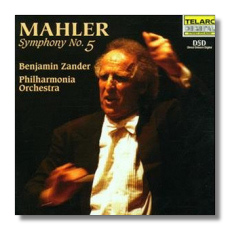
The Internet's Premier Classical Music Source
Related Links
- Mahler Reviews
- Latest Reviews
- More Reviews
-
By Composer
-
Collections
DVD & Blu-ray
Books
Concert Reviews
Articles/Interviews
Software
Audio
Search Amazon
Recommended Links
Site News
 CD Review
CD Review
Gustav Mahler

Symphony #5
Philharmonia Orchestra/Benjamin Zander
Telarc 2CD-80569 DDD 68:06, plus 78:18 bonus disc
Also released on Hybrid Multichannel SACD 2SACD-60569
Amazon
- UK
- Germany
- Canada
- France
- Japan
- ArkivMusic
- CD Universe
Zander's Mahler Fifth is a revelation, or, if that word is too dramatic or clichéd for you, a grand explication. Although he makes no grandiose claims to have done so, one senses that he has done everything in his power to conduct the score as Mahler would have conducted it. This does not mean treating the score as a Bible to which one may neither add nor take away – a dull and unimaginative approach to "authenticity" at best. It does mean educating oneself about performance traditions, about the musical and social milieu of late 19th-century Vienna, and about Mahler himself. Zander is nothing if not earnest. Like Mahler himself, his time has come: Zander seems poised for the international recognition that came to a conductor such as Günter Wand decades after he had started fighting the good fight in less central regions of the music world. Zander's Telarc recordings with the Philharmonia – his first to reach the mainstream – already include a Mahler Ninth (CD-80527) and Beethoven's Fifth and Seventh (CD-80471); his Mahler Fourth will be released in August 2001 (2CD-80555). This is only the beginning!
Zander's is a structured and objective interpretation, with appropriate drama but no souped-up hysteria. The Adagietto is treated as a song of love, not as a dirge, and the symphony steadily progresses from darkness into light. He favors a flexible beat, and he responds quickly to the ever-changing directions included in Mahler's score. He also is extremely skilled in shedding light on its thickest or most polyphonic sections. The Philharmonia is sympathetic to his intentions. On the whole, I don't feel that the its playing reaches the same high levels as Zander's conducting, yet I don't feel that this creates any serious problems; it's just that little of the musicianship calls attention to itself. Unless I am mistaken, the violins are separated, a feature that I do applaud.
As with the previous Zander releases for Telarc, there is a free "bonus disc" that includes the conductor's spoken commentaries. It's like attending an unusually interesting lecture in your local college's "Great Masterworks" class. Zander discusses Mahler's orchestration, his use of motives, the symphony's structure, the Adagietto (with special attention paid to the problematic issue of tempo), the Scherzo, and "Experiencing the Symphony." The last section, with its enthusiastic delivery, removes all doubt – if there was any – that this music is Zander's life. One has to go back to Leonard Bernstein (a very different musician) to find a conductor who communicates to non-musicians this clearly both on and off the rostrum. Zander's comments are supplemented by excerpts from a number of recordings – and not just Telarc's – including a piano roll of Mahler himself playing an excerpt from the first movement, and some of Willem Mengelberg's astonishingly fluid and portamento-rich Adagietto, as it was recorded in 1926.
A score such as Mahler's Fifth, with its dynamic contrasts and unusual sounds, thrives when it receives the best engineering available. Telarc has supplied exactly that here. The label touts an impressive dynamic range and frequency response; you will hear Mahler's music with unprecedented clarity, impact, and timbral realism on this disc.
No matter how many Mahler Fifths you already own, there should be room in your collection for this one. It is the best to come along since Claudio Abbado's 1993 recording with the Berlin Philharmonic (Deutsche Grammophon 2CDs 437789-2 or 2SACDs 477071-2).
Copyright © 2001, Raymond Tuttle





















